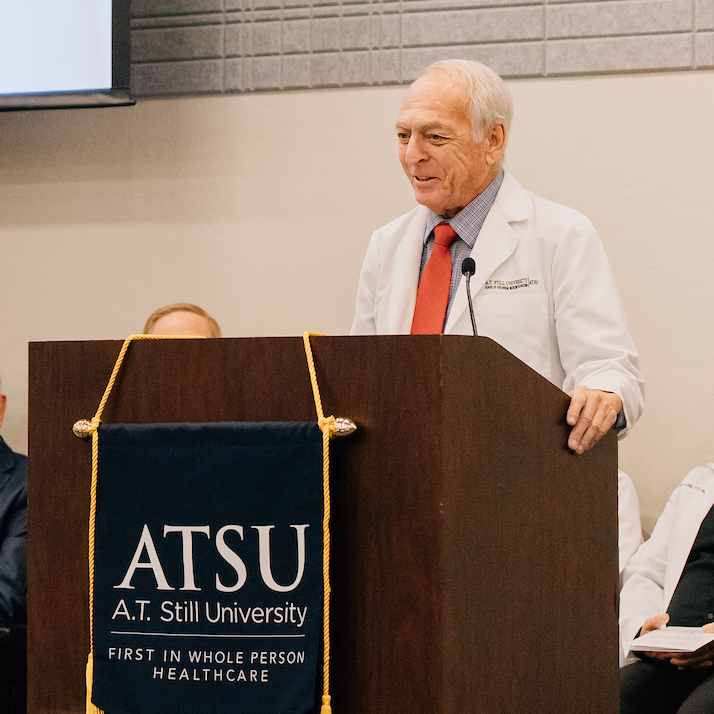ATSU-ASHS Doctor of Physical Therapy program students receive white coats, inspiring words
Posted: June 8, 2023
A.T. Still University-Arizona School of Health Sciences’ (ATSU-ASHS) Doctor of Physical Therapy (DPT) program celebrated 57 students entering their clinical experiences with a White Coat Ceremony June 1, 2023, at the Mesa Convention Center in Mesa, Arizona.
Philip Paul Tygiel, PT, MTC, hFAAOMPT, FAPTA, delivered an inspiring keynote speech to the students, who are entering their third and final year of the DPT program.
Tygiel graduated from New York University in 1972 with a certificate in physical therapy and earned his manual therapy certification from the Institute of Graduate Health Studies in 1981. He operated his own practice for more than 40 years before retiring in 2015.
Tygiel has been active in the American Physical Therapy Association (APTA) and the APTA’s Arizona chapter. He has served as APTA chief delegate and chapter president, and continues to serve as federal affairs liaison, a position he’s held since 2002.
A section of Tygiel’s speech appears below. Visit ATSU’s YouTube channel for the entire speech and ceremony.
—–
“The first thing you should learn on your internships is how much you know. You are leaving here with a wealth of knowledge that has been imparted to you by your professors, your reading, and your research. You’re just not sure about how to use all of that knowledge. That is a common fear we all have upon graduation. Have I really learned anything? You are about to find out you’ve learned a lot.
“Every patient is a new practical learning experience who will present history, signs, and symptoms that will help you reflect on what you learned and help you determine a probable diagnosis and plan of care. There is no curriculum in clinical education. You learn your lessons as they show up.
“You will be surprised at how much you recall from what you learned in school. Oh yes, I remember that. This patient probably has a particular type of rotator cuff tear and these are the additional tests I need to confirm that, and this is probably the most appropriate treatment approach to start with. You will know all of that without ever having seen a patient with a rotator cuff tear before.
“You will also be able to identify some of the less common presentations, even recognizing when a patient with a presentation of low back pain actually may have a neoplasm rather than a simple musculoskeletal injury. Again you’ll know that without ever having seen a patient with low back pain or a neoplasm before.
“You will be able to recognize the difference between upper motor and lower motor neuron lesions.
“You will know it because of the knowledge you are leaving here with, some of which you are not even consciously aware you have.
“A good clinical instructor will help you with that. The job of a good clinical instructor is to teach you how much you know, not how much they know. A good CI will ask you a lot of questions. Don’t be intimidated by the questions. They are not meant to trick you or judge you. They are meant to help you think and apply what you know to each particular patient.
“The second thing you should learn on your internships is how little you know. Despite everything I said before, despite all the knowledge you have gained, there is still so much more to learn, and if you work at it and you are lucky, every day should be a new learning experience. There is an old saying, ‘The more education you have, the more you know how little you know.’ That can be frustrating but also enlightening. One of the hallmarks of the professions is that professionals recognize their own limitations.
“Some of the gaps in your knowledge will be because they were things you were never taught or had the opportunity to read about. As good as your instructors were, they couldn’t teach you everything. Here is where you have to search for answers. You can start by asking questions of your clinical instructors. They may know or be able to help you find the answers. Question and answer sessions can lead to great discussions, learning experiences, and collegial relationship development.
“You can also do some of your own research. An education is far more than learning stuff. It is also about developing the skills to learn more.”